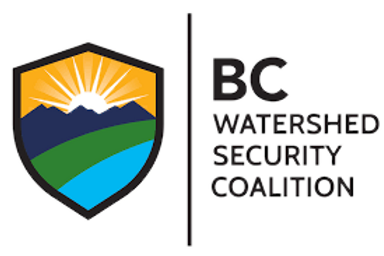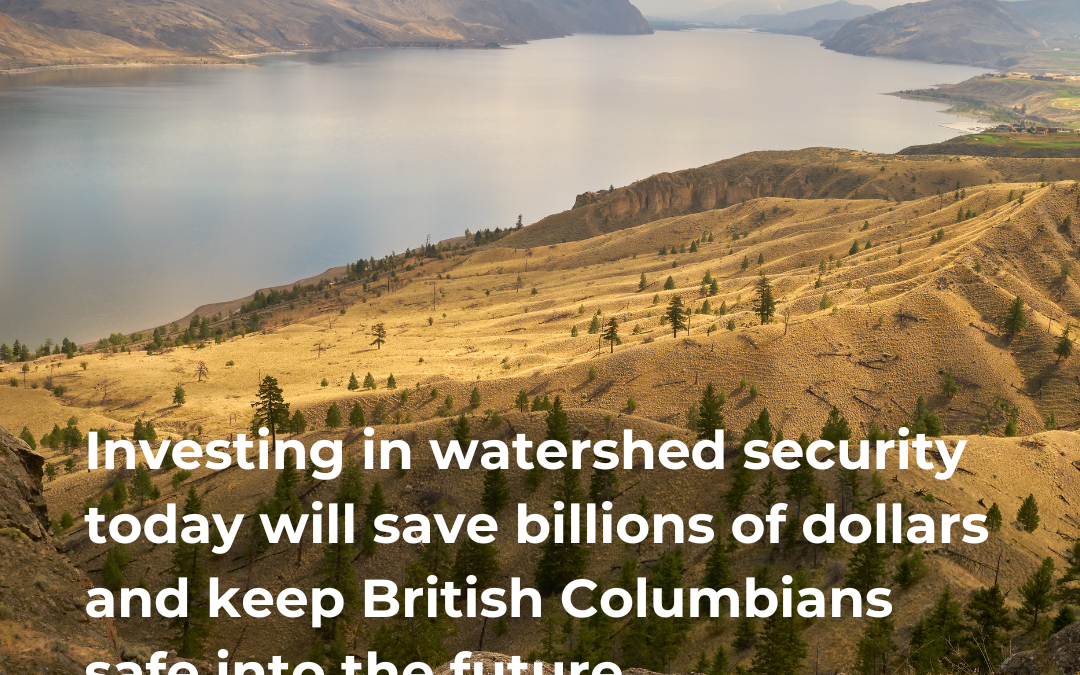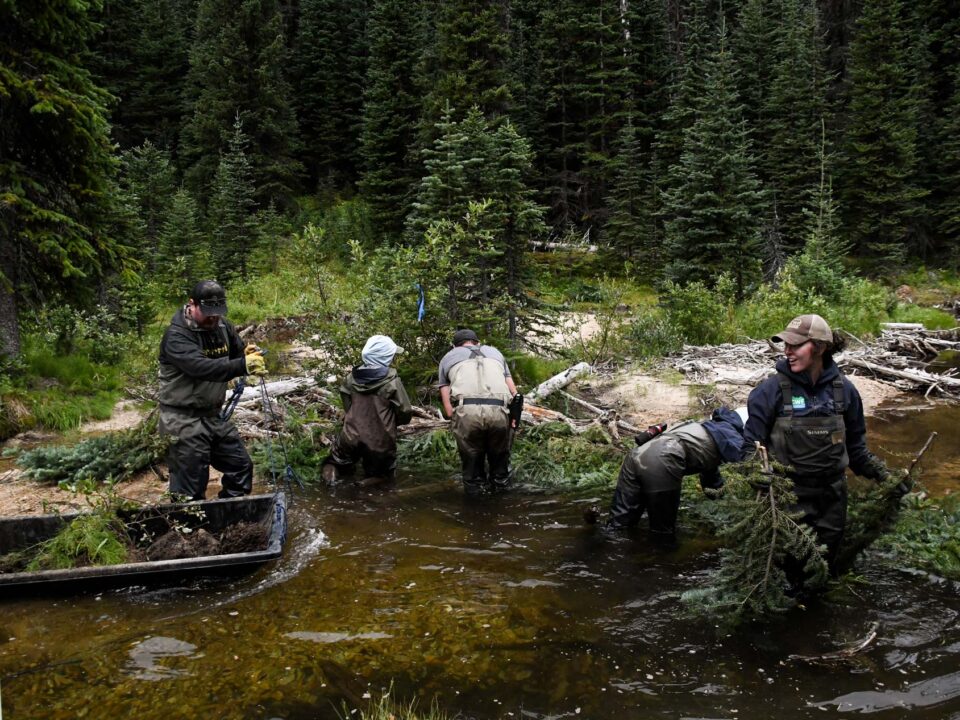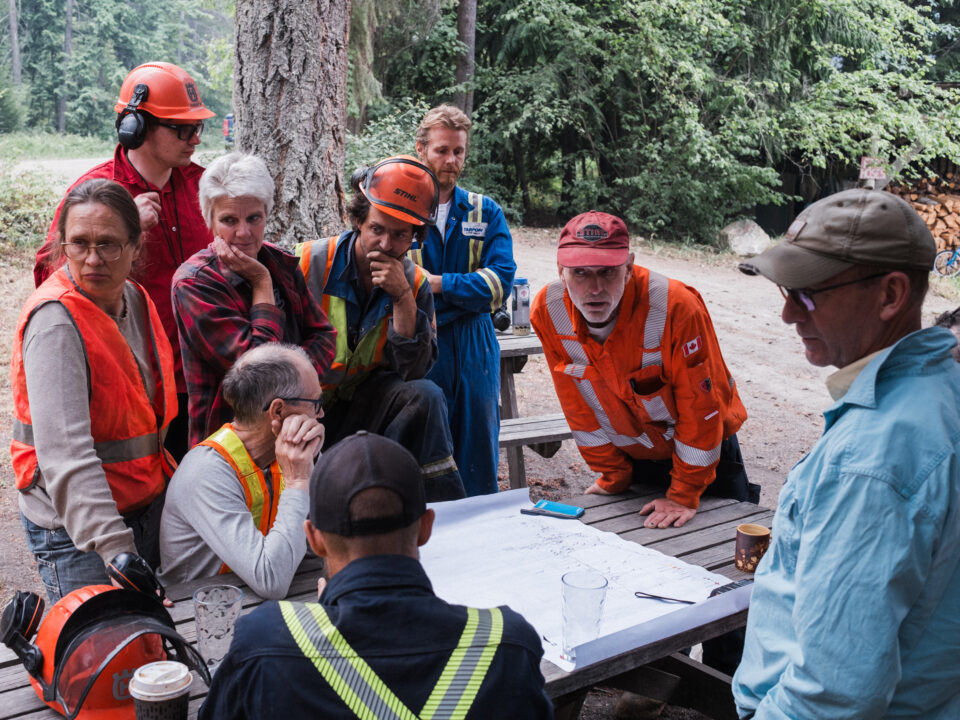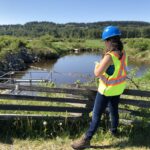
Coree Tull: Why B.C.’s rivers and watersheds should be a priority this election
September 24, 2024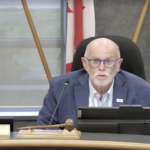
Lake Country mayor addresses water woes ahead of B.C. election
October 15, 2024BCWF Watershed Team. September 27, 2024. Original article.
The BC Watershed Security Coalition is asking all candidates in the 2024 BC Election to sign the Watershed Security Pledge as a commitment to invest in the health and well-being of British Columbians and the economic stability of local communities.
Provincial funds from the Watershed Security Fund are diminishing as we head into 2025, which could threaten dozens of shared projects between First Nations and their partners, including the B.C. Wildlife Federation.
“Threatened and damaged wetlands and watersheds are crucial habitat for fish and wildlife and our programs are focused on repairing the damage and protecting B.C.’s greatest assets,” said B.C. Wildlife Federation Executive Director Jesse Zeman. “We need to focus on watershed health to mitigate flood, drought, and wildfire risks and to ensure healthy wildlife populations. Our partnerships with First Nations are a core element of those efforts.”
Major First Nations collaborations supported by Watershed Security funds include the Bonaparte coho channel restoration (Bonaparte First Nation), the Yaqan Nukiy Wetlands Project (Lower Kootenay Band), the Fraser River Tidal Marsh Clean-up (Tsawwassen First Nation), and 10,000 Wetlands Initiative to build 100+ beaver dam analogues. There are dozens of others.
“This work is important because wetlands are some of the most valuable habitats you can restore,” said Norm Allard, Community Planner for the Lower Kootenay Band.
Over the past four years, the work of the BCWF’s Watershed Team has grown significantly thanks to Watershed Security funding, pursuing wetland and stream restoration projects alongside B.C. First Nations from B.C.’s West Coast, Northern, Okanagan, and Kootenay regions. This effort has included on-the-ground restoration projects and customized field training for dozens of Indigenous partners.
In 2021, the BCWF received a one-year $5-million grant from the Healthy Watersheds Initiative, which spawned the Wetlands Workforce—the largest collaborative wetland initiative of its kind in British Columbia, comprised of partnerships with eight organizations and engagement with over 50 First Nations.
That year, the BCWF’s Wetlands Workforce project assessed, restored, maintained, and monitored 252 wetland sites in collaboration with 40 First Nations communities. Those early successes led the provincial government to supply additional bridge funding of $5.5 million to advance collaborative watershed work to support Reconciliation, provide meaningful employment, and jump start rural economies.
“I’m so happy to see the participation we’ve had this year from First Nations and individuals from Indigenous communities,” the late First Nations Liaison Glenn Auger said at the time. “This initiative creates a legacy of sustainability.”
Since receiving Watershed Security funding, the BCWF has put Reconciliation at the heart of its watershed work. We hired a full-time Indigenous Liaison, who has been instrumental in fostering relationships with Indigenous communities and facilitating project collaboration. As a result, the BCWF has strengthened its engagement with First Nations communities, aligning projects with their goals and providing economic benefits. Elder engagement events were held to gather valuable input. Additionally, in 2023, the BCWF published We Are of Water, a graphic novel by Indigenous artist Chenoa Gao, to illustrate Indigenous perspectives on water stewardship.
But with bridge funding set to run out at the end of this fiscal year (March, 2025), the momentum and progress made over the past three years will come to an abrupt halt. To continue our watershed security and Reconciliation work, BCWF is calling for stable, long-term funding.
“The B.C. Wildlife Federation is committed to partnerships with First Nations to create a prosperous and sustainable shared future,” said Zeman.
Over the past three years, the BCWF’s Watershed Team has conducted over 100 training workshops for more than 1,000 participants. These workshops cover key topics such as wetland function and maintenance, forest range assessment, fish habitat restoration, and the use of the Wetland Ecosystem Services Protocol (WESP).
WESP can be significant asset for First Nations. As an assessment tool for wetlands, WESP offers a practical way to view critical habitats, quantify the services they provide, and identify high-value wetlands for restoration and enhancement.
“WESP could be a key tool in the toolbox for land managers, helping them identify and conserve wetlands across the landscape,” said Neil Fletcher, BCWF Director of Conservation Stewardship. “This tool has been adapted in other states and Canadian provinces, and we feel it will be a great addition to wetland conservation in B.C.”
BCWF is working with more than 40 First Nations including the Lheidli T’enneh, Saik’uz, and Binche Whut’en First Nations to implement WESP wetland assessments in their traditional territories.
The B.C. Wildlife Federation hopes the provincial government is true to its word when advancing Reconciliation and restoring fish and wildlife habitat.
“Losing the ability to continue these projects, losing sustainable jobs for First Nations communities, and hobbling the valuable relationships we have built with our partners over the past four years would be a terrible blow to Reconciliation,” said Zeman.
The $100-million Watershed Security Fund announced last year is operated as an endowment to ensure long-term sustainable funding. That means that as the endowment grows slowly, grants are trickled out at just a few million dollars a year in amounts that are shared between many applicants. According to the BC Watershed Security Coalition, a $1-billion fund, supported by provincial, federal, private and philanthropic investments would provide $75 to $100 million annually, required to make real progress on healing our watersheds.
Watershed Security Pledge – 2024 BC Election
Water is life, and BC’s watersheds—our rivers, lakes, wetlands and aquifers—are vital lifelines that deliver essential services to all British Columbians:
- Healthy watersheds provide clean, safe drinking water and a reliable water supply for local businesses.
- Healthy watersheds sustain our food supply and offer natural defenses for our homes against floods, fires, and drought.
- Healthy watersheds support vibrant habitats for wild salmon, bears, and the natural gifts that define this beautiful province.
However, over the past 20 years, the degradation of BC’s watersheds combined with more severe drought, floods and wildfires, have dramatically increased watershed insecurity. This decline has had severe impacts on communities, First Nations, local economies, and ecosystems across BC.
Visit https://www.watershedsecurity.ca/pledge/ to check if candidates in your local area have signed, ask your candidates to sign the pledge, or thank your candidate for signing.
